#Adequate Staffing
Explore tagged Tumblr posts
Text
Ensuring high levels of patient satisfaction in healthcare settings often comes down to one crucial factor: adequate staffing. In areas like medical staffing in St. Louis, Missouri, it’s clear that having a well-staffed team directly impacts the quality of care patients receive. When facilities are appropriately staffed, healthcare professionals can give each patient the time and attention they deserve, leading to more positive experiences and outcomes. Proper staffing not only improves the efficiency of care but also fosters a supportive environment for both patients and staff.
0 notes
Text
survived all 3 days of black friday weekend o7 and don’t have to deal with cyber monday either

#actually it wasn’t too bad. largely bc my store believes in adequate staffing#we did sell out of a few things almost immediately (like. within 15 mins) of opening friday tho#anyway my queue is empty now rip
7 notes
·
View notes
Text
What a week
Today would have been Chester's 5th Gotcha Day. Instead, he died in my arms on Monday morning. So much for having a relaxing day off from work, but still, glad that I was home and with him when it happened. I'm just now realizing that I didn't ugly cry about missing him yesterday, which I have very mixed feelings about. On the other hand, I ugly cried about it for half of my therapy session this week. I think it was the first time that I've really cried in a session with this therapist.
Then, I had the experience of terminating a contract at work. Fortunately the process is very impersonal and hands off, because I'm way too much of a softie and it might have killed me to actually have that conversation on top of dealing with Chester.
Now I've inherited this person's entire caseload, which is a full time caseload for someone with no admin duties. I have...many admin duties. The only day that I did not spend 10-12 hours in the office this week was the day that I had to leave slightly early for my therapy appointment.
I stepped back from helping at a huge training exercise in a few weeks because I know I don't have the time for it. I'm begging for a part-time backfill. But apparently I'm also in danger of losing one of my psychiatrists, which is not cool and would take my patient care to 1.5 FTE which is insane.
So, I'm frustrated with work and my leadership, and their ability to demonstrate that they actually support me. I'm preemptively feeling overworked and underappreciated. I'm sad and miss Chester and need to figure out how to combine cages so all the girls have enough space to be civil.
On the bright side, finally working my first shift as a solo medic is so sweet
#this week man#this week can largely go to hell#pet loss#pet death#guinea pig#chester#adventures in middle management#adequate staffing sounds like a fever dream#healthcare these days#did I really go to med school for this?#volunteer paramedic#volunteer firefighter#EMT
5 notes
·
View notes
Text
Congrats—you’ve just discovered the purpose of the middle-manager. Cost-cutting, even at the expense of essential staff coverage; then, throwing the remaining workers under the bus every time an *error* occurs, that would probably have been avoidable…
What part of 'the wellbeing of workers has an impact on the work they do' is hard for some people to understand? Like even if you don't have a single fraction of common decency or care for other peoples' welfare, and don't care whether they live or die, you should still care whether you live or die. You don't have to be morally against human suffering in order to believe in workers' rights.
An overworked truck driver falls asleep on the wheel and swerves on you in traffic? You're gonna die. An overworked nurse doing a 24 hour shift gets two patients confused? You're gonna die. A bridge collapses under you because the building materials provided were dogshit, and none of the builders wanted to speak out because the one to voice a complaint is going to get fired, and they all have kids to feed? You're going to die.
You literally do not have to care about other people. Nobody is demanding you to give a shit whether anybody else lives or dies. You just have to aknowledge that if the people touching your food, building the roads you drive on and buildings you go into, and altogether work in putting together every single thing that you need in order to live, are dying on the job, that's gonna hurt you too.
Being served like a God and fed with human sacrifice does not make you immortal like one.
#Alas sweet summer child#the gamble of fines for loss of life vs upfront costs for adequate staffing/quality trained employees (in any industry)/and sufficient#time for recooperation is still considered more of a strain to bottom line#than cutting costs in all the above domains and figuring the company is saving money for their investor payouts when#factored against a fine—even to the tune of millions of dollars—for the *occasional* horrendous OOPS of error resulting in avoidable loss
16K notes
·
View notes
Text
tbh i don't even blame night shift when half the shit they were supposed to do went undone. We're all just tryna survive here
#Would it be better for patients if shit got done?? YES#but that would require adequate staffing and sensible assignments
0 notes
Text
my workplace: hey Rockstars! we're putting everyone on phones for an unspecified number of calls this morning, Mondays are always so busy, what can you do. You Rock!! Don't forget to Make It A Great Day! me: *planning out my exit interview in my head*
#what you can do is hire more people and figure out how to treat them with enough basic respect that they don't immediately quit#failing that the company needs to let more contracts go if it can't maintain adequate staffing to serve them all
0 notes
Text
"Efficiency" left the Big Three vulnerable to smart UAW tactics
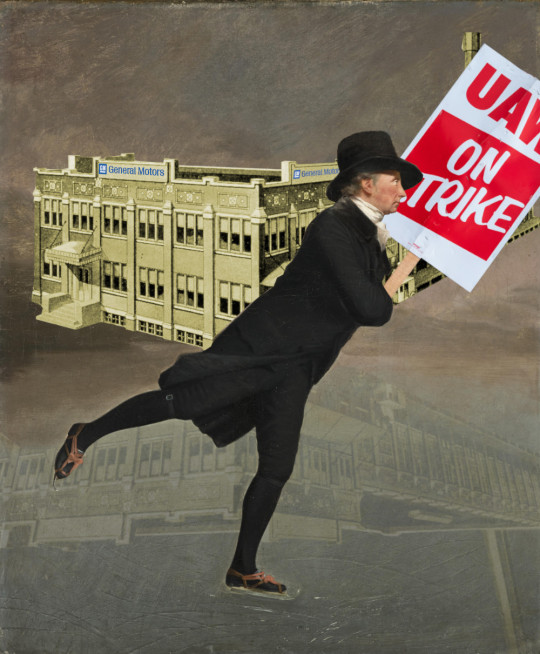
Tomorrow (September 22), I'm (virtually) presenting at the DIG Festival in Modena, Italy. Tomorrow night, I'll be in person at LA's Book Soup for the launch of Justin C Key's "The World Wasn’t Ready for You." On September 27, I'll be at Chevalier's Books in Los Angeles with Brian Merchant for a joint launch for my new book The Internet Con and his new book, Blood in the Machine.

It's been 143 days since the WGA went on strike against the Hollywood studios. While early tactical leaks from the studios had studio execs chortling and twirling their mustaches about writers caving once they started losing their homes, the strikers aren't wavering – they're still out there, pounding the picket lines, every weekday:
https://www.cnbc.com/2023/08/09/how-hollywood-writers-make-ends-meet-100-days-into-the-writers-guild-strike.html
The studios obviously need writers. That gleeful, anonymous studio exec who got such an obvious erotic charge at the thought of workers being rendered homeless as punishment for challenging his corporate power completely misread the room, and his comments didn't demoralize the writers. Instead, they inspired the actors to go on strike, too.
But how have the writers stayed out since May Day? How have the actors stayed out for 69 days since their strike started on Bastille Day? We can thank the studios for that! As it turns out, the studios have devoted so much energy to rendering creative workers as precarious as possible, hiring as little as they can getting away with and using punishing overtime as a substitute for adequate staffing that they've eliminated all the workers who can't survive on side-hustles and savings for six or seven months at a time.
But even for those layoff-hardened workers, long strikes are brutal, and of course, all the affiliated trades, from costumers to grips, are feeling the pain. The strike fund only goes so far, and non-striking, affected workers don't even get that. That's why I've been donating regularly to the Entertainment Community Fund, which helps all affected workers out with cash transfers (I just gave them another $500):
https://secure2.convio.net/afa/site/Donation2?df_id=8117&8117.donation=form1&mfc_pref=T
As hot labor summer is revealed as a turning point – not just a season – long strikes will become the norm. Bosses still don't believe in worker power, and until they get their minds right, they're going to keep on trying to starve their workforces back inside. To get a sense of how long workers will have to hold out, just consider the Warrior Met strike, where Alabama coal-miners stayed out for 23 months:
https://www.thenation.com/article/activism/warrior-met-strike-union/
As Kim Kelly explained to Adam Conover in the latest Factually podcast, the Alabama coal strikers didn't get anywhere near the attention that the Hollywood strikers have enjoyed:
https://www.youtube.com/watch?v=UvyMHf7Yg0Q
(To learn more about the untold story of worker organizing, from prison unions to the key role that people of color and women played in labor history, check out Kelly's book, "Fight Like Hell," now in paperback:)
https://www.simonandschuster.com/books/Fight-Like-Hell/Kim-Kelly/9781982171063
Which brings me to the UAW strike. This is an historic strike, the first time that the UAW has struck all of the Big Three automakers at once. Past autoworkers' strikes have marked turning points for all American workers. The 1945/46 GM strike established employers' duty to cover worker pensions, health care, and cost of living allowances. The GM strike created the American middle-class:
https://prospect.org/labor/2023-09-18-uaw-strikes-built-american-middle-class/
The Big Three are fighting for all the marbles here. They are refusing to allow unions to organize EV factories. Given that no more internal combustion cars will be in production in just a few short years, that's tantamount to eliminating auto unions altogether. The automakers are flush with cash, including billions in public subsidies from multiple bailouts, along with billions more from greedflation price-gouging. A long siege is inevitable, as the decimillionaires running these companies earn their pay by starving out their workers:
https://www.businessinsider.com/general-motors-ceo-mary-barra-salary-auto-workers-strike-uaw-2023-9
The UAW knows this, of course, and their new leadership – helmed by the union's radical president Shawn Fain – has a plan. UAW workers are engaged in tactical striking, shutting down key parts of the supply chain on a rolling basis, making the 90-day strike fund stretch much farther:
https://prospect.org/blogs-and-newsletters/tap/2023-09-18-labors-militant-creativity/
In this project, they are greatly aided by Big Car's own relentless pursuit of profit. The automakers – like every monopolized, financialized sector – have stripped all the buffers and slack out of their operations. Inventory on hand is kept to a bare minimum. Inputs are sourced from the cheapest bidder, and they're brought to the factory by the lowest-cost option. Resiliency – spare parts, backup machinery – is forever at war with profits, and profits have won and won and won, leaving auto production in a brittle, and easily shattered state.
This is especially true for staffing. Automakers are violently allergic to hiring workers, because new workers get benefits and workplace protection. Instead, the car companies routinely offer "voluntary" overtime to their existing workforce. By refusing this overtime, workers can kneecap production, without striking.
Enter "Eight and Skate," a campaign among UAW workers to clock out after their eight hour shift. As Keith Brower Brown writes for Labor Notes, the UAW organizers are telling workers that "It’s crossing an unofficial picket line to work overtime. It’s helping out the company":
https://labornotes.org/2023/09/work-extra-during-strike-auto-workers-say-eight-and-skate
Eight and Skate has already started to work; the Buffalo Ford plant can no longer run its normal weekend shifts because workers are refusing to put in voluntary overtime. Of course, bosses will strike back: the next step will be forced overtime, which will lead to the unsafe conditions that unionized workers are contractually obliged to call paid work-stoppages over, shutting down operations without touching the strike fund.
What's more, car bosses can't just halt safety stoppages or change the rules on overtime; per the UAW's last contract, bosses are required to bargain on changes to overtime rules:
https://uaw.org/wp-content/uploads/2023/09/Working-Without-Contract-FAQ-FINAL-2.pdf
Car bosses have become lazily dependent on overtime. At GM's "highly profitable" SUV factory in Arlington, TX, normal production runs a six-days, 24 hours per day. Workers typically work five eight-hour days and nine hours on Saturdays. That's been the status quo for 11 years, but when bosses circulated the usual overtime signup sheet last week, every worker wrote "a big fat NO" next to their names.
Writing for The American Prospect, David Dayen points out that this overtime addiction puts a new complexion on the much-hyped workerpocalypse that EVs will supposedly bring about. EVs are much simpler to build than conventional cars, the argument goes, so a US transition to EVs will throw many autoworkers out of work:
https://prospect.org/labor/2023-09-20-big-threes-labor-shortages-uaw/
But the reality is that most autoworkers are doing one and a half jobs already. Reducing the "workforce" by a third could leave all these workers with their existing jobs, and the 40-hour workweek that their forebears fought for at GM inn 1945/46. Add to that the additional workers needed to make batteries, build and maintain charging infrastructure, and so on, and there's no reason to think that EVs will weaken autoworker power.
And as Dayen points out, this overtime addiction isn't limited to cars. It's also endemic to the entertainment industry, where writers' "mini rooms" and other forms of chronic understaffing are used to keep workforces at a skeleton crew, even when the overtime costs more than hiring new workers.
Bosses call themselves job creators, but they have a relentless drive to destroy jobs. If there's one thing bosses hate, it's paying workers – hence all the hype about AI and automation. The stories about looming AI-driven mass unemployment are fairy tales, but they're tailor made for financiers who get alarming, life-threatening priapism at the though of firing us all and replacing us with shell-scripts:
https://pluralistic.net/2023/03/09/autocomplete-worshippers/#the-real-ai-was-the-corporations-that-we-fought-along-the-way
This is why Republican "workerism" rings so hollow. Trump's GOP talks a big game about protecting "workers" (by which they mean anglo men) from immigrants and "woke captialism," but they have nothing to say about protecting workers from bosses and bankers who see every dime a worker gets as misappropriated from their dividend.
Unsurprisingly, conservative message-discipline sucks. As Luke Savage writes in Jacobin, for every mealymouthed Josh Hawley mouthing talking points that "support workers" by blaming China and Joe Biden for the Big Three's greed, there's a Tim Scott, saying the quiet part aloud:
https://jacobin.com/2023/09/republicans-uaw-strike-hawley-trump-scott/
Quoth Senator Scott: "I think Ronald Reagan gave us a great example when federal employees decided they were going to strike. He said, you strike, you’re fired. Simple concept to me. To the extent that we can use that once again, absolutely":
https://twitter.com/American_Bridge/status/1704136706574741988
The GOP's workerism is a tissue-thin fake. They can never and will never support real worker power. That creates an opportunity for Biden and Democrats to seize:
https://pluralistic.net/2023/09/18/co-determination/#now-make-me-do-it
Reversing two generations of anti-worker politics is a marathon, not a sprint. The strikes are going to run for months, even years. Every worker will be called upon to support their striking siblings, every day. We can do it. Solidarity now. Solidarity forever.



If you'd like an essay-formatted version of this post to read or share, here's a link to it on pluralistic.net, my surveillance-free, ad-free, tracker-free blog:
https://pluralistic.net/2023/09/21/eight-and-skate/#strike-to-rule
4K notes
·
View notes
Note
Ok but you have to include the full clip though
The guys name is Paul Parker and he’s literally my hero
youtube
The clip is funny ofc, he literally tells sco mo to square up, but it’s also heartbreaking to see how run down and exhausted he is- how all our volunteers were- during black summer. My parents are both full time rfs members and I’m nearly of age to become an offical member myself, and I can’t begin to describe how run ragged they are every bush fire season, let alone 2019-20. My dad’s birthday was just a few days ago and while we were sitting in our living room cutting the pavlova he was still on call with the radios by his side. Our emergency service workers- the rfs, the ses, paramedics and support services and so many more- are overworked and underpaid and constantly let down by our government, and good old Scotty from marketing is a prime fucking example.
Fuck Scott Morrison, support your local brigades.
I just spent some time scrolling through this blog and am suffering from sever laughter. Thanks so much for collating the countries craziest moments. One of my favourites is when Scott Morrison was in Hawaii while the bushfires where burning.
December 2019: As Australia's east coast is engulfed in the worst bushfires in living memory, rumours begin to circulate that Australia's Prime Minister Scott Morrison may have secretly fucked off for a holiday in Hawaii.
Keep in mind, this is what is going down in Australia at the time:

The Hawaii rumour is initially written off as a fringe conspiracy, because surely nobody could be that fuckin tonedeaf, and it was quickly forgotten about... until an Australian man visiting Hawaii UPLOADED A SELFIE ON THE BEACH WITH THE PM THROWING A SHAKA.
At which point all hell broke loose.

Overnight the formerly popular "Scomo" became the most despised man in all of Australia. Think "firefighters shouting out of their windows to news cameras" level of despised.
After about two days of radio silence and pretending like he was still at home running the country, the Prime Minister's handlers finally dragged him onto call with an Australian radio station, where he pinky promised to return to Australia as fast as he could in an attempt to calm things down.
Unfortunately Scott's empathy consultant (a real job) then had to watch Scott pour more gasoline on the dumpster fire by uttering the now famous phrase "Look I don't hold a hose mate" when asked by the radio interviewer why the fucking fuck the fuckhead wasn't fucking in Australia doing his fucking job during a massive fucking crisis.
Testing just how much worse things could get, Scomo then proceeded to NOT rush back to Australia as promised, instead attempting to complete the rest of his holiday, a fact that was exposed when a passerby snapped a picture of him still lounging on the beach two days later.

Eventually, holiday complete, Morrison did reluctantly slink back to Australia, and in an attempt to calm things down, he decided to pay a visit to a small town that had been destroyed by the fires.
Which was a big mistake.
Scomo still had not registered how absolutely and totally he had screwed the poodle with his Hawaiian beach vacation, and he walks into what is now taught in PR classes as one of the greatest examples of "what not do do in a crisis" in all of history.
Scotty from Marketing, as he is now dubbed by the nation, spends a painfully cringe-inducing hour wandering around a burned down town with TV news cameras in tow, having to FORCE PEOPLE TO SHAKE HIS HAND in what is some of the most awkward footage you will ever see.
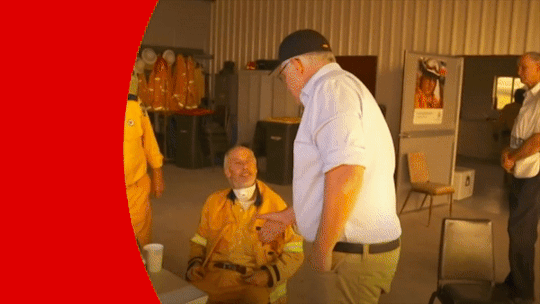

At this point it's probably also worth mentioning that, before becoming Prime Minister, Scott Morrison's biggest claim to fame in politics was being the guy that was so far up the coal lobby's arse that he literally brought coal into parliament and waved it around, claiming it doesn't hurt people.

So when a protest was organised it turned out to be one big national fuck you to the Prime Minister, the likes of which the world has never seen before or since.
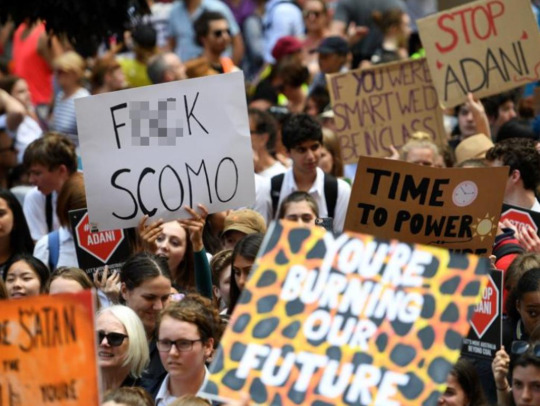
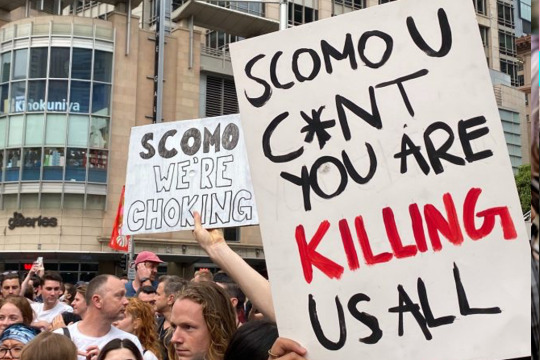

Needless to say, at this point Scomo's career was dead in the water, but thanks to the rules brought in to stop Australian political parties from knifing their leader every two weeks (a popular Aussie passtime) Morrison basically couldn't get fired until after the next election.
And so, when the election rolled around in 2022, we decided that was an opportune time to travel over to Hawaii to erect this bad boy tribute to the Prime Minister, on the very beach where Scomo had sat and drank margaritas that one fateful week in December as Australia burned (thanks to @chaser for funding the ticket)
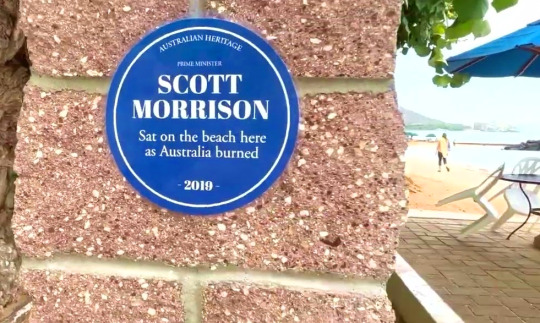
#sorry I’m really passionate about this#all the time I sit with and listen to my parents- mostly my mum- talk about how they’re overworked and being fucked over#how her bosses are laying off part timers working communications to ‘open spots for full time workers’ who aren’t there#and how they missed their yearly pay rise at the end of 2020 because corporate just ‘couldn’t afford it’#meanwhile the tops got another pay rise that was literally about the amount she makes in a year#and they apparently upped the pay rise a little the next year but that doesn’t make a fucking difference because it means they’re all#getting less money over the course of their whole CAREERS because it’s supposed to be compounding#and I’m just so sick of everyone being fucked over like this and listening to my mum talk about how tight money is#and I’m lucky for it not to be so tight as to be noticeable- in terms of what we buy for food or the opportunities I get to have as a scout#since we don’t usually just buy things whenever- though around this time of year we’re obviously spending a lot more than usual#but I just know that most people in emergency services#these people doing really dangerous and easily potentially traumatising jobs#are not being adequately cared for and looked after by our government#I’m just so fucking sick of it all the time#the overtime and the years of missing Christmas and birthdays because the people in power won’t listen to the experts warnings#and won’t fund for the proper staffing to keep staff from undue fatigue and stress#and I know it’s harder than them than it is on me- a lot fucking harder#I mean- missing chirstmas day isn’t that big a deal#it’s happened often enough over the years and we always celebrate it on another day anyway who cares about the specifics#and birthdays are fine- a couple presides in the morning before school and work and out for something fun when we have a free day#but I know they feel so guilty for missing these things#because it’s so important to them and they can’t be there#all this stuff is mostly my mum- she’s a shift worker and she has to drive like two hours to get to work everyday and then two hours back#my dad works closer to home and mostly in infrastructure and such so it’s not as demanding for him#but even so he still has so much overtime this time of year#and because of the way he works half the time when he’s not at work he’s on call to respond to incidents#anyway I’m ranting when I should be sleeping#sorry#entirely forgot this was about sco mos incompetence anyway get fucked Scotty#Youtube
9K notes
·
View notes
Text
Coming to this dance teaching job after three and a half years of food service is WILD. I feel like a little abused rescue animal that finally found a loving, forever home.
#i'm paid for reading work-related emails#we're adequately staffed#mistakes are okay#i'm doing what i love#WHAT IS THIS
1 note
·
View note
Text
i realize i never posted these boys

these are my boys for my restaurant AU: "Have You Eaten?"
the basic premise is this: Y/N works a stressful job where keeping up appearances is paramount. They often treat their clients to a meal at their favourite restaurant, run by the DCA boys—the nutrition-conscious chef Sun, the sweet and friendly chef Moon, and the charming front of house Eclipse. Y/N always orders something small and light so they can focus on talking with their client and maintaining appearances—nothing too large, nothing messy, nothing indulgent. Then after the meal, they walk their client to their car and they wait for their client to leave. Secretly, Y/N is a glutton. Once their client leaves, they hurry back to the restaurant, where their true meal is hot and ready for them.
Eclipse: Welcome back, Starlight! Ready for your second course?
Moon: Do you wanna skip straight to dessert? I tried a new recipe for donuts!
Sun: No. The hour is late, you should have something simple and adequately filling before bed.
Eclipse: Or... maybe you're interested in something "off the menu?"
they're a silly bunch (:
some other notes under the cut
the title is "Have You Eaten?" which is a common greeting in multiple languages. There's something warm about being greeted with this check-in to make sure you that have taken care of your body.
the restaurant is mostly based on a Hong Kong style cafe (a cha chaan teng) but the specials change often and often branch into other types of dishes and cuisines, because the boys like to experiment with new recipes.
Eclipse does have 4 arms, but he usually hides his second pair away because he's found it disturbed customers.
they can eat as an alternative method of recharging, and they can turn off their taste buds. Sun in particular has a bad habit of eating food scraps.
the DCA's relationship with each other is... complicated? They don't exactly like each other but are forced by their code to remain within a certain distance to each other. So they begrudgingly work and live together and cause trouble for each other's lives.
despite having separate bodies, their code forces them to stay within a certain radius (1515 feet, or the approximate distance between the 2 furthest points of the Mega Pizzaplex). They wear clip-on earrings to extend the range whenever they need extra space (usually Eclipse, hence why he has so many).
Eclipse is the oldest—he was built first for the theatre. Many years later, Eclipse was moved to the daycare to entertain children. But since they were short-staffed, Sun and Moon were built using Eclipse's code to help him at the daycare.
their pizzaplex was left to ruin and the three of them got out and were picked up by an old chef, who took them in and taught them everything he knows before leaving his restaurant to them and passing away.
i would like to write something for this AU. The main story still needs some work, but I have a lot of little drabble ideas that I might write. Or maybe it will be an AU full of drabbles. That's a possibility too. Although I would like to explore stories with other y/ns, like one who is a picky eater, one who has a lot of food allergies, etc.
also head's up: innuendos. innuendos everywhere. (most of which are Eclipse's fault)
#fnaf sun#fnaf moon#fnaf eclipse#fnaf dca#dca fandom#Have You Eaten? AU#Sun Have You Eaten? AU#Moon Have You Eaten? AU#Eclipse Have You Eaten? AU#crab art#bright colours#traditional art#these guys are SO fun#it started off with a silly little idea#and then i shared the idea with friends#and RPing helped me figure out their characters SO much#like#starriegalaxy and vacantfields are responsible for the way Eclipse turned out#Eclipse was born for me to torment my friends with (:
712 notes
·
View notes
Text
Like other sectors, healthcare is not immune to challenges, especially regarding staffing. Several issues persist, but healthcare facilities can navigate these challenges efficiently with the right medical and nurse staffing strategies.
0 notes
Text
lovelorn and nobody knows

Sometimes it felt like you had the words “I’m in love with my boss” written on your forehead in big capital letters.
As much as you tried to hide it, you couldn’t help but marvel at him. He was truly amazing at his craft and seeing him so passionate made you want to do it as well.
There were times that he acted a little like a jerk but he’d redeemed himself recently. Thanks to Sydney.
And to Claire.
You were surprised when you learned he was seeing someone. He brought Claire around when the restaurant was practically falling apart. It was such a weird moment. You physically could feel the awkwardness in the air.
She seemed really nice but part of you still disliked her just because she could call Carmy hers.
You avoided being around them as much as possible. It hurt just looking at the way he smiled at her.
Every part of your being wished that were you.
You wished you were the one he confided in after a long day at the Bear. You wished that you were the one he walked around the city with hand in hand. You wished you were the one that had his heart.
You felt like a lovesick fool.
Instead of subjecting yourself to seeing the happy couple, you started to back out of any group activities unless it was absolutely necessary.
The group would often go and get drinks at a nearby bar at least once a week. You stopped going as soon as you heard Claire was a regular now. People would ask if you were going and you always had a lie ready to go.
As much as you loved working at The Bear, you knew that it would probably be best if you removed yourself from the situation. It hurt every time you had to be around Carmen and Claire. You didn’t want to constantly put yourself in heartache.
There was a popular Italian restaurant across town that needed a sous. You had a friend of a friend that recommended you. It was the fresh start that you needed.
When you got the job, it was bittersweet. You should’ve been happier than you were.
So, you drafted up a letter of resignation, took a deep breath, and walked into Carmen’s office after closing. He was busy looking at an invoice when you knocked softly on the doorframe to make yourself known.
He looked at you and smiled a little, “Hey, stranger. We missed you last night.”
“Yeah, sorry I missed it. I uh- have something to give you.” You wanted to get this part over with.
“Yeah? What’s that?” He reached over and grabbed the letter that you handed him. You hoped he didn’t notice the slight shakiness of your hand.
You didn’t answer him because you didn’t trust your voice in that moment. Carmen quickly read through your letter and you watched the expression change on his face.
“What the hell is this? You’re leavin’?” Carmen stood up from his seat and placed your letter down.
“I got a job opportunity that I couldn’t say no too. I’m sorry that this puts you in a situation where you are short staffed but I’m giving you a two weeks notice.” You explained to him.
“I don’t understand. You’re happy here, aren’t you? D-did something happen’ that I’m not aware of?” Carmen questioned.
Yeah, you fell in love with someone else.
You shook your head, “No, nothing happened. I just think I’m ready for a new challenge.”
Carmen didn’t look like he bought your lie. “(Y/n), you don’t think that I’ve noticed that you’re distant and-and you haven’t been coming out with all of us?”
Shit.
You’d hoped that maybe he was so busy with Claire that he hadn’t noticed you slipping away from the group at all.
“I’ve just been busy with other things.” You lied again.
“What’s going on?” He questioned.
“Nothing is going on, Carmen.”
He crossed his arms against his chest and it took everything in you not to stare and drool. Even when you tried to be strong, his biceps made you feel weak.
“I don’t believe you.” He stated.
“That’s fine. I just wanted to do the respectable thing and give you an adequate notice.”
Carmen stared at you and it made you feel like he could read your mind. Like he knew the exact reason on why you were leaving.
“I don’t want you to leave, (Y/n). I think you’re amazing and- and you have a bright future in this industry. I think it’s a mistake.”
Your chest ached at his kind words. “I’m just ready for something new.”
He sighed and looked away from you as someone knocked on the door. You turned and saw Claire holding a takeout bag, “Thought I’d surprise you with dinner.”
“Now isn’t a good time, Claire.” Carmen told her.
She looked disappointed, “Am I interrupting something?”
You quickly shook your head, “No, the conversation is over. Have a good night.”
“(Y/n), wait!” Carmen called out to you but you left his office without another look back.
Even thought it killed you to walk away from him, you had to put yourself first.
#carmen berzatto x reader#carmen berzatto imagine#carmen berzatto x (y/n)#carmen berzatto x you#carmen berzatto#the bear x reader#the bear imagine#carmy x reader#carmy berzatto
1K notes
·
View notes
Note
What an interesting topic. I’ve heard that a large percentage of employees cite their bosses as the reason they leave their jobs. What are some ways companies try to mitigate this?
They don't.
I can really only answer for my company, which cared about retention (of employees) a lot. Many companies do, because it costs much less to recruit/onboard/train as little as possible, and because it can be hard to get the work done without adequate staffing. I'd add that my company had one area in which staffing was a nation-wide crisis; also my company was in the public sector and was in the press a lot, which mean they cared about their image.
They still didn't do that much to ensure that people had good bosses. That has less to do with this company and more to do with the structure of business in capitalist society. This is a big reason HR is never going to be that helpful unless you've got a tiny company that, completely by luck, has mostly good folks.
A company isn't going to take a generalized point about folks leaving their job because they don't like their bosses as fact. Companies feel they are too diverse and the financial risk is too great to pour money into something if they don't have hard data, so the first step to retention is getting data. You would think exit interviews would be really informative, but those require a lot of time which equals staff which equals money. Some employers do them but mine would only do one if you asked, and then they did nothing with the info. This is because the company's mentality was "well, if you're leaving you're probably really dissatisfied and we don't want to hear about that." I know this makes no sense. But in general, not just in the business but in this society (formed by capitalism), the idea seems to be if you're dissatisfied it's your fault. Meanwhile the company is interested in data about why people stay; they figure if folks are satisfied, that's the company's fault and they want to keep doing the same so they can retain employees.
Our company had a huge employee satisfaction survey they did every year that included questions about employee opinions about the company, their colleagues, and their bosses. You get emails to remind you to take it and if you can't get time in the workday, bosses are supposed to allow time for it. Some problems with that are you still have to remember to take it; if you don't have time you have to ask a boss you might not like to get that time; some folks at my company literally had jobs that literally are life or death so it can be hard to take time to take a survey; the survey is only in English; the survey is only in the computer; the reminders are only in email. So you have to be a moderately good English speaker who regularly checks email and knows how to use a computer and gets regular access to a computer for the company to get your data about your satisfaction. As you can imagine, our most vulnerable employees often get missed.
If the survey showed that folks were really dissatisfied with a particular boss, that boss got put into a series of trainings. Training is good, but US businesses (and plenty of employees themselves) seemed to have latched onto the idea that training is the be-all, end-all of improvement. Many of us saw this in response to the discussions about EDI (equity, diversity, and inclusion) that came about in 2020; business promised to be anti-racist and had some EDI seminars to prove it, and that was all. Why is it like this? What is really needed to make bosses better bosses? And why isn't that being done?
When it comes to "why is it like this": recruiting and retaining good leaders is hard. The way someone becomes a boss in almost any organization is a) management likes them, and/or b) they were good at a job in a lower level or different department, or c) they come from the outside with a good resume and what sounds like good experience. But a lot of time, management likes people who aren't disruptive, and sometimes folks who aren't disruptive are the folks who are not thinking for themselves and not asking questions and doing everything the way they're told even when it doesn't make sense. That doesn't make a good leader. As for folks who are good at the lower level job in the hierarchy or in another department, they aren't always good at managing. It's a different skill set, but I've seen a lot of leaders and employees make this mistake. They think that that the folks who are great at the job should be promoted, and honestly that really doesn't make sense. And last but not least, folks who get hired from the outside are a complete crapshoot, because experience with leadership does not necessarily a good leader make.
As for what is needed to make bosses better bosses, imo what you would really need is someone embedded within the department who is managed by the boss and is doing the same work as the other employees, but also has the training and experience to evaluate what the boss is doing well and isn't doing well, and then also has the authority and buy-in to work with the boss so that the boss can shadow and learn the leadership skills they need. Then, if the boss can't improve, there would need to be the will within the org to fire or demote that boss, and often that will doesn't exist because recruiting bosses is so hard and the training is usually monumental.
Side note, what I'm describing is what consultants should do and normally don't. Consultants come in and ask a lot of questions and do focus groups and maybe some observations, but they are not in there doing the work understanding what it is like to live in this world, and without that I frankly find a lot of the work they do useless. That said, consultants are almost always hired to identify inefficiencies; they're not really there to make it a more satisfying job. Imo, the greatest efficiency is a satisfied worker, but it is hard to get the data to point that way, and again, companies only want data, and again, your dissatisfaction is your own fault.
Another side note, this is why unions are so great. Union stewards are folks who work for the company but can act as a union representative. This means they're embedded in the department and doing the work everyone does, but they can also at times step outside that role and carry the authority of an outside entity that does have some power to use against the employer. This is why all employees should have a union.
So, why aren't companies doing this? As you can imagine, hiring the ambassador to embed within a department, training them, paying them for their time--all of these are just too cost prohibitive to justify when they only thing you're getting out of it is employee satisfaction. It is also possible to improve employee satisfaction by paying employees more, which is in fact why I stayed in this job I hated as long as I did. I was getting paid so much that it just did not make sense to walk away without a firm plan in place. In the end, paying employees more costs less than ensuring they have a good boss.
I have lots more to say about this, but I've said a lot already, so if anyone has follow up questions, feel free to send more asks.
164 notes
·
View notes
Text
Now, the United States appears happy to bypass the Palestinians in the discussion of how many of them should have to die. The State Department talks of dealing with a “humanitarian crisis” in Gaza without mentioning who has caused it. In American papers of record, Palestinians almost always seem to die from mysterious bombs that theoretically could have come from anywhere. CNN will report on the spread of disease and the treating of innocent children with deep wounds, but the initiators of their suffering are downplayed. NPR will play audio diaries of doctors working in emergency rooms without adequate staffing, equipment, or medicine, but fail to mention how Israel’s systematic targeting of hospitals brought about these horrors, in direct violation of international law no less. This type of talk comes so naturally that it is almost reflexive. Attributing blame, connecting dots, and reporting the full picture requires acknowledgement of the reality on the ground in Gaza. It would require going past easy-to-read IDF statements, jeopardizing Israeli contacts and imperiling press access to IDF-guided tours. It would require confronting the fact that a majority of Americans and Brits back a ceasefire in Gaza, and acknowledging that the actions undertaken by Israel would be unconscionable to anyone who has eyes and doesn’t have a heart like a cinder. Therefore, the tried and tested methods of denial return, diminishing returns be damned. To the American, war, when abetted by Americans, must always be draped in some sort of impenetrable fog. Bullets fly from unknown places, infections and starvation spread just because, and suffering is abstract and inevitable—up until an ally might be blamed. The only motives to be given prime time coverage are America’s: always moral, always undertaken to protect the international rules-based order.
252 notes
·
View notes
Note
Hey so your post about pain management as a bedside nurse is so important to my own nursing practice that I've considered printing it out so I can have it to hand all the time. So thanks for that. Also, how do you deal with assignments that are busy enough that pain management is harder than it should be? I'm coming up on two years as a nurse and I feel like I take it personally when I am too busy to adequately manage my patients pain. I'm also coming from a newly unionized hospital where the ratios are still horrendous (I do 1:10 on med surg) and I'm hoping once we can enforce our staffing grids it'll be better but idk I'm burning out and I love my job so much and I really respect your nursing philosophy? I guess. Sorry for the word vomit it's been a crazy shift.
I've been trying to think of how to answer this since I got it. It's just such a horrendous ratio. With ten patients a shift, that's like six minutes an hour for each in a fantasy world where there's no charting and everything is exactly where you need it to be. I feel like I don't have great insight into this because the most med surg patients I've had assigned is five. Ten patients to one nurse is just a raw deal for everyone. Like christ no wonder you feel like you're burning out! I'll give you what thoughts I have and hopefully other people can chime in if they have suggestions. But that's such a hard patient load.
When I've been super swamped, I've found that's when being really explicit about your thinking with the patient helps. Like if I have to dash into a room and then dash back out, I'll make sure the board is updated with the next medication time and that the patient knows when the medication is going to kick in. I'll also provide call light parameters. I have a lot of success telling people, "the med should be doing something by 5:30. If I haven't checked in with you by then, and the pain is unchanged or barely changed, hit your call light and we'll try the next step. Also hit your call light if you feel any sudden change, like now you're nauseated or you have a headache or the type of pain changes or something just feels very wrong. Is there anything you need before I step out of the room?"
I like to be explicit about when to call me because I think there's two directions call light usage can go wrong: someone calls all the time, or someone never calls. With someone who calls all the time, I find that telling them when I'll be back and that I want them to call me if I'm not takes away some of that anxiety that can causes some people to call frequently. Often those patients are afraid that if they aren't on the call light, they're gonna get ignored.
For the other type of patient, the one that doesn't call, I want to make explicit that it's GOOD AND NORMAL TO CALL YOUR NURSE WHEN YOU HAVE SYMPTOMS. We've all had that patient at the end of shift who goes, "btw the gnawing pain in my leg is now a 10/10" and you're like "what gnawing pain sir?? you've literally never mentioned it before now?? I don't have any meds for that lemme page super quick????" These patients can get into pain crises easily because they don't ask for help until something is unbearable. In addition to pain crisis bad, it takes a lot more time to deal with something unbearable than it does to deal with something uncomfortable.
On that note, are you spending your very limited time efficiently? To me, that actually means spend more time talking with patients, at least up front. Manage expectations, make sure people know what to expect. Having conversations with patients that are like, "You just had surgery, it's not gonna happen that we get you completely painless. We want to get you to a manageable pain level that allows you to do whatever it is you most want to do this shift." (For me on nights, that's usually sleeping at least a little, but sometimes the realistic goal you make together is that you will feel at some point better than you feel right now.) "You have this medication scheduled, and you have this one available every X hours when your pain is severe. Is there anything you know that helps you deal with pain?"
Also establish if patients want to be woken up for certain prn medications or if they're sleeping, to let them sleep. With some patients, I will advise them to get woken up for pain medication because I know that they're going to need consistent control to avoid a crisis. (Crises take so much time!)
When I'm crunched for time, I'm fond of bringing in an ice pack and being like "if it works, great, if it doesn't, just take it off, either way here it is." Sometimes I'll do the same with a warm blanket. If I know my patient needs to take pills, I'll bring a cup of water with me into the room. If there's a basic prn like melatonin or tylenol that I think they might want, I'll pull them in advance. If the patient doesn't want them, I return them next time I'm in the med room. (Obviously, don't do this with controlled substances. It's super easy to forget to return them, and not returning opioids is one of those whoopsies people get fired over.)
Decision making takes time. Walking to go get stuff takes time. I want to save the time it takes to assess if the patient needs those things and then walk off to fetch them by just having the things already. If your tightest resource is time, be liberal with resources you can spare. If you're stuck with a patient, do you have anyone you can delegate a prn med pass to? Do you know how to do the absolute minimum charting you need to? Do you have flushes and alcohol wipes and whatever other most common things you need? And since you can't hoard time, if you've got some to spare, ask yourself if there is anything you can do now that will save you time later. If you have five free minutes now and an incontinent patient, getting them up to the bathroom now can save you from taking the time for incontinence care and a bed change later on when they've also sundowned and decide they hate everything but most of all you.
So much of this answer I realize is investing as much time upfront as you can, which I realize is so hard when you are so busy. It sucks immensely that prepping takes much less time than not being prepared does when you don't always have time to prep. Plus when you invest that time to pain plan with patients and do small preventative interventions, I think it also provides some psychological comfort that helps with pain. You're letting them know you're invested and you care and you have a plan, even if you don't have all the time you'd like. That can mean better pain control, which can mean needing to spend less time in that room overall, meaning you can save six whole minutes at some point and maybe even, if we're feeling crazy, get a chance to indulge in that greatest of indulgences: just a real leisurely on-shift piss.
#nursing tag#i hope this helps at all i know how much it sucks to end a shift like 'cool. i didn't help my patients. feel great about that.'#it sucks when you don't have enough time to take care of people because you have too many people to take care of#anyway also thank you re: pain post compliment. and also thank you re: getting to talk about pain mgmt again#marge simpson holding potato voice: i just think [nursing process and symptom management] is neat!
148 notes
·
View notes
Note
Did you hear about joannes going bankrupt? Do you have any thoughts on that?
(Quick note so no one um actually's me: I'm aware that not all bankruptcy is Chapter 11. Thank you)
As a crafter, I'll say: oh dear, that's going to make shopping harder.
As a person who was aware of the insides of how that company was running, I'm going to say, "about fucking time."
See, here's what was happening with Joann. Problem #1 was that they stopped taking the "you have to spend money to make money," mentality and applying it to labor. A store is not about the products or the customers. The life of a store, the thing that keeps it beating, is the employees who serve the customer and serve the corporate ownership.
When they first started notably cutting labor, the store did have a lot of driven, passionate people who were willing to pick up the slack. It's possible to cut the freight shift one night a week when you have daytime floor associates who can do the freight when there's no customers immediately needing help. You can expect store managers to clean and recover the store, because it's a task that keeps them free to disconnect from when a store needs a manager to be acting as a manager. You can expect any free employee to fill in at the register or cut counter to cover a break or a lunch or fill in during a high-customer time. The store had a lot of employees who didn't mind doing some multitasking, and didn't mind being completely busy from the start of the shift until the very end.
However, when these labor cuts proved to be an effective way to save the store money, the amount of multitasking, and the amount of expecting one shift to cover for cuts made to another shift, started going up. It was no longer cutting the freight shift one day a week. It was cutting the freight shift until it was ONLY one day a week.
And that's where they made the big mistake in labor load. Instead of, "serve the customers, and do these tasks when you have time," it became, "do the task, and serve the customers if they demand your attention." A store is not the customers; it's the people who work in the store. But one of the key players in a retail store's staffing is the employees for whom making the customers happy is their primary drive. The way that stores were staffed, people whose primary drive was to serve customers were not allowed to adequately do so to reach customer satisfaction.
We need to add to this that, in addition to demanding more from every employee, Joann corporate has several of their demands on employees to be automatically measured. Customer response surveys, ship-from-store fulfillment, buy online pickup in store response times, number of remnants that were rolled to be sold, all of that can be sent to corporate with a pass/fail number assigned to it. Other elements of the store, like how much freight from a box actually makes it onto the shelf on time, or if a wheelchair can navigate the store, are not measured. This means that the company prescribes which tasks will actually be done and which can be shoved in the back for later. With the work load that was being put on employees, corporate decided that the ONLY tasks that should get done are ones that have specific metrics tied to them.
Employees whose drive is to help customer, who are not permitted to help the customers asking for help, will quit and go to a place where customers actually come first. Employees who are okay with doing two people's jobs, but who are asked to do three jobs, will leave to a place where they only have to do one job. Employees who have worked for the company for 4 years and never received a raise despite being praised for excellent work will go to a job where they get paid more. And suddenly, the only people who are left are the people who aren't overworked, because they're the people who will only do one job no matter how much demanding corporate has for them.
The last two years that I was at Joann, there were tons of employees asking or begging for more hours. It was not that they couldn't hire people. It's that they wouldn't assign labor hours. Employees who would happily work 35-40 hours a week, but who are assigned three hours a week, will leave and find a job where they can get a consistent number of hours. When they made all floor managers part time, a lot of people who had been with the company for years left to get more hours or some health insurance.
But, despite all of this, corporate never said, "if we put more people on the floor, our customers will be happier, and will spend more money." They still continued to treat labor as an unnecessary expense that should be limited. Why put more people on the floor when you can just overwork the people who bothered to show up for work today?
So, weirdly enough, that business model was absolutely not working for them, and it's all come crashing down. Damn right, as it should be. Respect the people who work for you, and they'll work for you. Take away the things that they're there to do, and they'll go somewhere else. Simple math.
Also, in the last decade, the fact is that, "Joann has a lot of coupons, so I can save money!" changed in the eye of the public into, "Joann is overpriced unless you know how to play the coupon game."
So yeah. I'm not surprised, and I hope their restructuring does good things for the employees who work there. Hell knows they need it, because their current system just proved that it cannot survive in that state.
147 notes
·
View notes